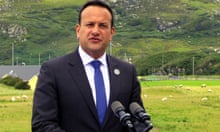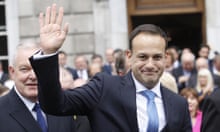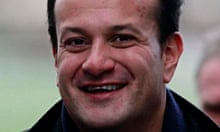Leo Varadkar, who is gay and half-Indian, has won the leadership contest of Ireland’s Fine Gael party, and, aged just 38, is set to become the republic’s youngest taoiseach. Around the world this has been lauded as a sign of Ireland’s progression to cosmopolitan modernity. Reuters hails Varadkar’s leadership as a “huge generational shift”.
But Varadkar is a conservative. Left-leaning folk in Ireland are hoarse trying to explain to the faraways that, yes, we understand the optics – but this is Ireland, land of the topsy-turvy, where the election of a gay person of colour at the same time signals the entrenchment of anti-woman, anti-working-class austerity-as-usual. There have been understandably frustrated reactions, not only to the tone-deaf global coverage, but also to the ostensible “identity politics” signalled by LGBT rights groups welcoming Varadkar’s election.
I am no fan of his. But I feel the following simple observation is necessary: we can celebrate the fact that Ireland’s next leader will be a gay man of colour, even while we protest his politics. It’s great that Ireland has socially evolved to the point that Varadkar’s race and sexuality are not barriers to his leadership; but it’s sad that the next taoiseach is a cardboard-cutout neoliberal.
Ireland only decriminalised homosexuality in 1993. And it wasn’t an easy sell. The public atmosphere was such that the Fine Gael member of parliament Paul McGrath could stand up in the Dáil and incredulously proclaim: “Are we now to see exhibitions in public by homosexuals? Holding hands, kissing, cuddling, etc?” (Please, no – not cuddling! Anything but cuddling!) McGrath wasn’t the fringe: he was the centre. That’s not quite 25 years ago.
Ireland now has gay marriage (voted for, I am proud to say, by 62% of the population), some of the world’s most progressive trans recognition legislation, and an openly gay presumptive taoiseach. When it comes to sexuality, we are clearly shaking off the shackles of Catholic dogma.
In 2004, the Irish population voted four to one in a referendum that makes me far less proud: removing citizenship rights from the Irish-born children of non-national parents. This implicitly racist move accompanied the inward migration resulting from Ireland’s economic boom, and signalled a rejection of the “new Irish”. In this context, it is a hopeful sign that our next taoiseach will be the son of an Indian migrant, that the person representing us on the international stage will not be a Murphy or McDonagh, but a Varadkar.
The barriers to participation placed on people by their race, sexuality, gender, class or ability are real. And representation is important. Half of LGBT students are bullied, in school and a third of young Irish LGBT people have attempted suicide. Varadkar’s success might help these kids to realise that many of their fellow citizens are on their side. It could also encourage more people of colour and LGBT folk to get into politics.
Yet Varadkar is not his sexuality or his race. In aradio interview he gave after coming out, he said: “I’m not a half-Indian politician, or a doctor politician or a gay politician, for that matter. It’s just part of who I am. It doesn’t define me.”
I agree that other parts of Varadkar are more helpful in defining him as a politician. Calling himself “pro-life”, he is a disaster for Ireland’s campaign for reproductive rights, and absolutely the wrong person to preside over the abortion referendum that he has inherited as a political inevitability.
Varadkar is intent on the project of demonising people on welfare. He recently fronted a €200,000 (£175,000) campaign with the catchy slogan Welfare Cheats Cheat Us All and a handy snitching hotline. This is despite the fact that there has been only one case of suspected identity fraud this year.
I can feel angry about all of this even while feeling proud that Ireland is the kind of country that has a new kind of taoiseach. The two ways of thinking don’t cancel each other out: they enrich each other, helping us to see politics from multiple vantage points. We can acknowledge the successes of our progressive movements even while limbering up for the next round of the fight.








